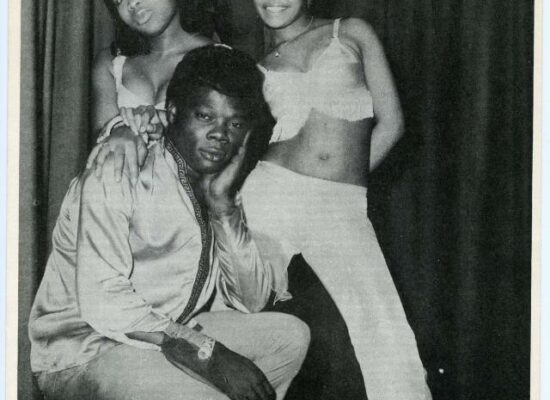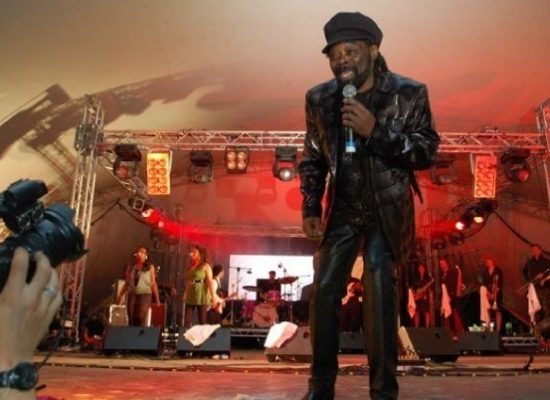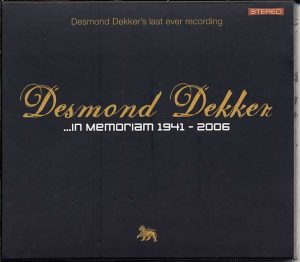

Delroy Williams was born on a farm in St Ann’s Jamaica, but left the island at nine years old with his parents to start a new life in England. Delroy was a great fan of Owen Gray who is one of Jamaica’s Foundation singers, whose work spans the R&B, SKA , Rocksteady and Reggae eras of Jamaican music, and was credited as one of Jamaica’s first home-grown singing stars. At fifteen years old Delroy had the opportunity to meet Owen personally in Brixton, London. From their first meeting, Owen Gray took Delroy under his wing and became his guardian and mentor in the music industry: they are still friends to this day.
In the early 1960’s, Delroy was singing along to a record playing on a jukebox in a cafe in Brixton. Bruce White and Tony Cousins of Commercial Entertainment heard Delroy singing and gave him their business card to call them.
The next day, Delroy called Commercial Entertainment and was invited to the office to meet with Bruce and Tony. When Delroy arrived, he met the two in the company boardroom where they told him that they thought Delroy had a great voice and wanted to introduce him to one of their bands. The following week, Delroy was taken to meet the Sugar Band, whom Commercial Entertainment also managed; this was the beginning of Delroy’s musical career.

The Beginning of Delroy’s Musical Journey
After a couple of years working with Commercial Entertainment, Delroy signed with the Mecca Agency. The agency gave Delroy additional exposure with an increased workload. Delroy performed across England and Europe, performing at all Mecca Ballroom establishments, including U.K and U.S military bases.
One Sunday, Delroy went for a walk in Brockwell Park, Brixton. During his walk, Delroy heard a jazz band performing at the bandstand close by. When Delroy arrived, he saw only three elderly women watching the performance. Delroy approached one of the band members after the performance to inquire who paid the band to perform.
Delroy learned that Lambeth Council in Brixton paid the jazz band to perform. Delroy went to the town hall the following Monday to inquire who was responsible for putting on bands in Brockwell Park. Delroy met with Roger Fox, who was in charge of the department, and inquired why there was no entertainment for the Black community in the park. Roger admitted that he was not sure how to go about it; he was not familiar with the music of the Black community. Delroy looked at him and said, “I’m here”.
Delroy’s Contribution To Music
In 1966, Delroy created the first-ever open-air Reggae Festival in London’s Brockwell Park when he was still just a teenager. The festival grew in popularity during the festival’s five-year run until 1971. The idea was so popular that in 1969, The Rolling Stones adopted the idea and held their performance in Hyde Park where it was considered a live music breakthrough. The Pilton Festival, now known as the Glastonbury Festival, was created in 1970. Admission for a show at that time was 15 shillings and a pint of milk.
In 1968, Delroy signed with Bell Records and recorded his first single called “Daoambanda”, but Bell Records went into liquidation a week after the release. In 1969, Delroy recorded his first single with Trojan Records, Ben E. King’s R&B hit, “Don’t Play That Song”. In 1970, Delroy recorded “Down in the Boondocks” by Billy Joe Royal.
As the years have passed, Delroy Williams has remained one of the most popular Reggae and Soul artists performing across the UK and European music scenes. He continued to create more successful albums until he retired in 1978 due to the birth of his daughter. However, he did not stay away from performing permanently.

 Delroy came back to the music scene in 1981 where he joined forces with Desmond Dekker, his long-time friend, as manager and backing vocals. Desmond Dekker’s last recorded album, produced by Delroy Williams was a re-recording of his most popular hits on the Secret Record label. Leeds University was Desmond’s and Delroy’s last show.
Delroy came back to the music scene in 1981 where he joined forces with Desmond Dekker, his long-time friend, as manager and backing vocals. Desmond Dekker’s last recorded album, produced by Delroy Williams was a re-recording of his most popular hits on the Secret Record label. Leeds University was Desmond’s and Delroy’s last show.
Four years after the death of Desmond Dekker, Delroy was persuaded to go back on the road with the Aces to keep Desmond Dekker’s music alive. Delroy and the Aces still tour to this day. Delroy has also performed with his friend, Prince Buster who was a Jamaican singer-songwriter and producer.
Delroy Williams & The Sugar Band / Delroy Williams Show 1965
The following is a sample of Delroy Williams first Tour in 1965:
• Rhodes Centre, Bishop’s Stortford, Hertfordshire – 29th January
• Blue Lagoon, Newquay, Cornwall with Spirit of John Morgan – 10th February
• Galashiels, Scotland – 1st & 2nd March
• Edinburgh, Scotland – 3RD March
• Aberdeen, Scotland – 4TH March
• Elgin, Scotland- 5TH March
• Stonehaven, Scotland – 6TH March
• Dundee, Scotland – 7TH March
• Forfar, Scotland – 8TH March
• Edinburgh, Scotland – 9TH March
• Glasgow, Scotland – 10TH March
• Playboy, London – 11TH – 16TH March
• Leytonstone, Essex – 17TH March
• Playboy, London – 18TH-23RD March
• Burton-on-Trent – 24TH March
• Recording – 25TH March
• Bournemouth, Dorset – 26TH March
• Catford, Kent – 27TH March
• Ealing, Middlesex – 28TH March
• Flamingo, Soho, London – 29TH March
• Gloucester, Gloucestershire – 30TH March
• Gillingham, Kent – 31ST March
• Rhodes Centre, Bishop’s Stortford, Hertfordshire – 1ST April
• Colchester, Essex – 11TH April
• Eastbourne, East Sussex – 12TH April
• Yeovil, Somerset – 13TH April
• Stockport, Great Manchester – 14TH April
• Leeds – 15TH April
• Hanley, Staffordshire – 16TH April
• Revolution, London – 17TH April
• Abingdon, Oxfordshire – 18TH April
• Perton – 19TH April
• Waddington – 20TH April
• Silver Ends – 21ST April
• London – 22ND-23RD April
• Weymouth, Dorset – 26TH April
• Torquay, Devon – 27TH April
• London – 29TH April
• Alex Disco, Salisbury – 14TH September
• Flamingo, London – 8TH & 20TH October
